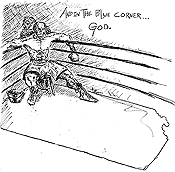
Stephen Jay Gould, Alexander Agassiz Professor of Zoology at
Harvard University, was on CNN's "Crossfire" the other night with the
Rev. Jerry Falwell, chancellor of Liberty University.
I watched with rapt attention.
Gould, for those not familiar with him, is among the world's most
prominent researchers and theorists on the topic of evolution.
Falwell, for those not familiar with him, thinks Tinky Winky -
the purple character with the inverted triangle on his head from PBS's
"Teletubbies" - is an ambassador of homosexuality.
The two were brought together to discuss the Kansas Board of Education's
6-4 decision to de-emphasize evolution in state-administered exams.
I always like watching two completely disparate people try to present
their point on an issue without upsetting the delicate balance between
their view and the other person's feelings.
The reason I enjoy it is because most people freak out, and the debate
descends to the Jerry Springer level of fisticuffs and low-brow insults.
As much as I love watching good television perish, it doesn't necessarily
make for productive debate.
"Crossfire" sets it up so the guests enter into an argument and
immediately make a number of assumptions about the other person's actual
viewpoint.
It doesn't really take any special effort from "Crossfire," though.
Most people are happy to make sweeping generalizations on their own. I am no
different.
For instance, I clearly led you to make an assumption when I mentioned
Falwell's indictment of Tinky Winky.
You might have concluded that Falwell is an ignorant goon.
You might have concluded that I had concluded that Falwell is an ignorant
goon.
You might have concluded that I had concluded that Falwell is an ignorant
goon, and thereby concluded that I am a left-wing pinko.
If that's the case, you're right.
However - most of the time when we enter arguments and we make all kinds
of snap judgments, we aren't right. Most of the time we skirt the real issue
because we're too busy defending ourselves against baseless accusations.
Gould spent much of his time advocating that creationism and evolution
are separate and should be taught in different venues. Falwell spent much
of his time advocating the merits of creationism.
Neither viewpoint was mutually exclusive. The only issue really in
contention between the two was whether creationism should be considered
a science.
Err....
In a case like this, it is important that we be conscious of the issues.
I do not believe creationism is a science because it is not a theory that was
developed in response to mounting scientific evidence.
Creationism is based on philosophical and religious principles.
Scientific evidence in its favor has been more of an afterthought - the cart
came before the horse; the theory came before the evidence.
I can't dip a thermometer into a stream to measure whether evolution
is taking place. It can't be tested. I can't borrow God's blueprints and take
them into Seaton Hall to be graded. He seems to have a rather tight grip
on things.
When a theory can't be tested, it is all the more important that it be
created in the spirit of addressing scientifically obtained evidence.
That's what makes a science. Whether we arose from primordial goo
or butterscotch isn't the issue. Creationism is not science.
That doesn't mean it shouldn't be taught. It just means creationism
shouldn't be taught in a science classroom.
Shifting the focus, none of this has anything to do with the state of
education in Kansas.
That's what the board of education believes, anyway. It says that
simply de-emphasizing evolution does nothing to harm our public school system.
But can we really believe that?
This rather out-of-the-blue whim by the board is receiving national
attention. Even though Kansas' debate might not be about the merits of
creationism vs. evolution, the debate on "Crossfire" was - great publicity.
If the nation believes Kansas has a flawed educational system, what
chance does a Kansas high school student have to get into an out-of-state
college or university? If the nation perceives Kansas as having a flawed
educational system, why would an out-of-state student want to come here?
K-State can't recruit a student in Illinois to come for a biology degree
if that student sees Kansas biologists as practicing bad science.
How do we defend ourselves against an assumption like that?